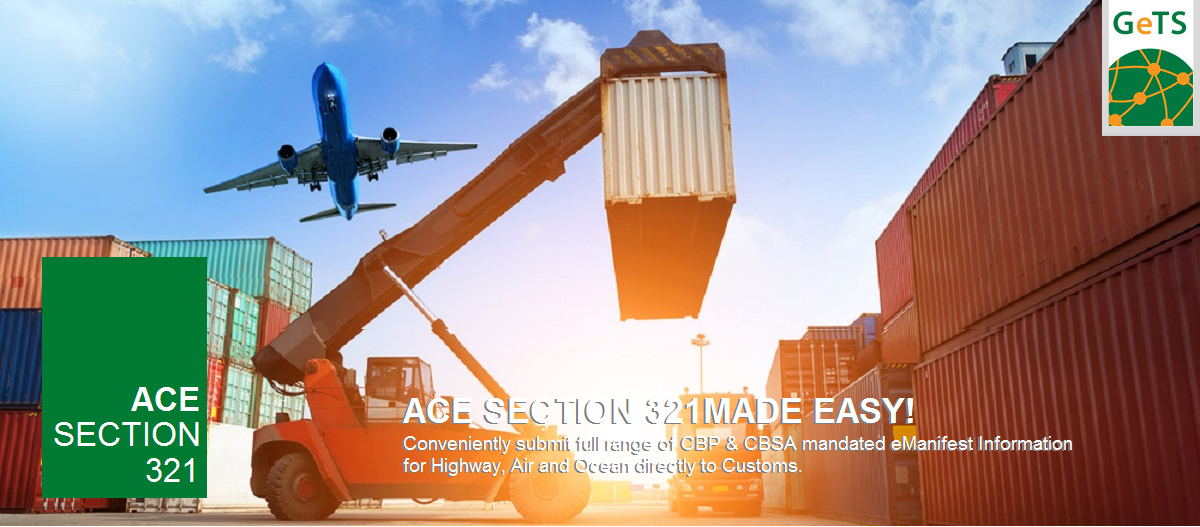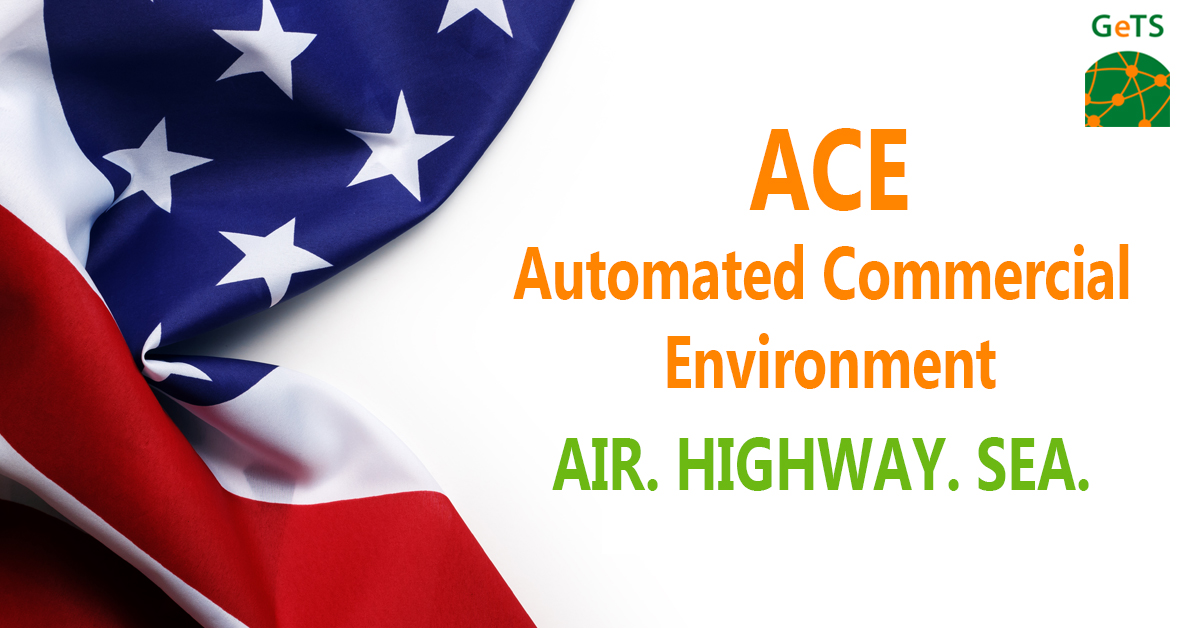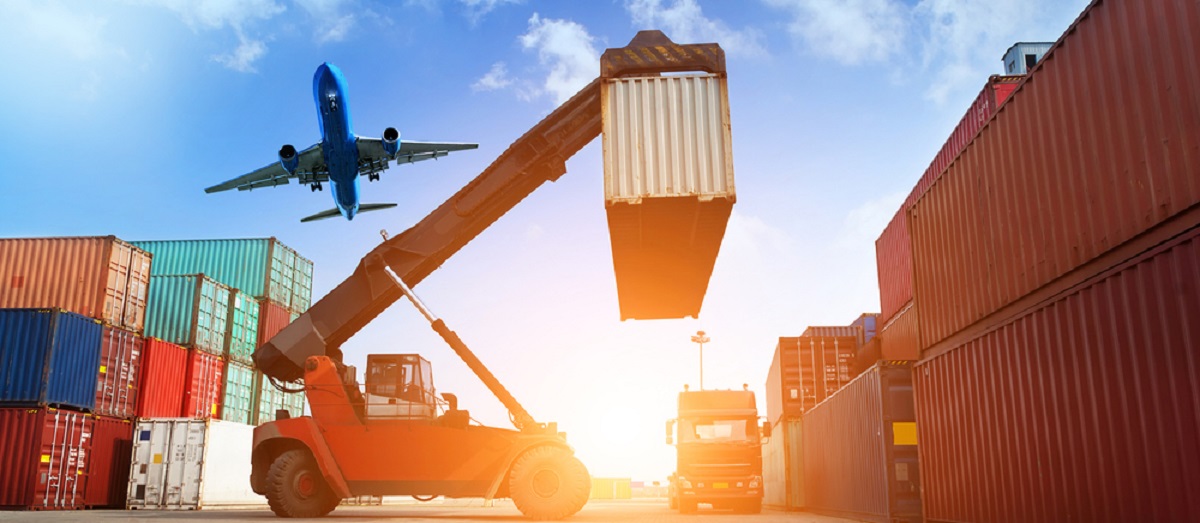Job Scam Alert:
This is to notify you that we have been alerted of job scams misusing the name of Global eTrade Services (GeTS). We would like to emphasize that there is no active, ongoing recruitment under the brand name of GeTS as we now operate under our parent company, CrimsonLogic. Please read the full disclaimer here.
- 21 Mar 2018
- USA
- USA
- ACE
- ACE eManifest
- US eManifest
- USA eManifest
- Automated Commercial Environment
- ACE Ocean
- Trade
- United States Customs and Border Protection
Regardless of value, certain products are not allowed or may need a formal entry and/or examination to enter the U.S. under the the product-based exceptions for ACE Section 321 release option.
Some commodities are regulated by certain agencies as well. These are:
-
Goods needing inspection before release
-
Goods subject to Anti-Dumping/Countervailing (ADD/CVD) duty
-
Restricted goods or goods that require an import permit or license from the Food and Drug Administration (FDA), Food Safety Inspection Service (FSIS), National Highway Transport and Safety Administration (NHTSA), Consumer Product Safety Commission (CPSA) and U.S. Department of Agriculture (USDA)
-
Shipments included in several lots under a single order or contract, sent separately to obtain duty-free release
-
Goods under tariff-rate quotas
CBP may refuse to clear a Section 321 shipment if the shipment is deemed high risk for a particular type of merchandise or class.
Please note that as of July 2017, the FDA has provided exemptions for this restriction for the following:
-
biological samples for laboratory testing
-
dinnerware, cosmetics
-
radiation-emitting non-medical devices
-
food (excluding ackees, puffer fish, raw clams, raw oysters, raw mussels, and food packed in airtight containers stored at room temperature)

ALCOHOLIC BEVERAGES
Alcoholic beverages for resale or commercial use cannot be cleared under the Section 321 release option. Alcoholic beverages require a permit from the Alcohol and Tobacco Tax and Trade Bureau (TTB) before import. Alcoholic beverages include distilled spirits, wines and malt beverages.
The importer must meet labeling standards set by the Federal Alcohol Administration (FAA) Act for wine (at least 7 percent alcohol by volume), distilled spirits and malt beverages. Distributors and foreign manufacturers of alcoholic beverages must also register with the FDA before the shipment enters the U.S. CBP will not release shipments of alcoholic beverages in any state if they are in violation of state laws.
Importers should check with other agencies like the FDA, Department of Agriculture and Animal and Plant Health Inspection Service (APHIS) for requirements on alcohol imports. For example, commercial imports of all food and beverage products require the filing of Prior Notice with the FDA.
TOBACCO PRODUCTS
Tobacco products not intended for personal use or consumption cannot be released under Section 321. Tobacco products include the following:
-
Cigars, including cheroots and cigarillos
-
Cigarettes containing tobacco
-
Cigarette tubes
-
Cigarette papers
-
Chewing tobacco
-
Smoking tobacco, including water pipe tobacco, pipe tobacco, and roll-your-own tobacco snuff
Tobacco products for resale or commercial use need a permit from the U.S. Department of Treasury's Alcohol and Tobacco Tax and Trade Bureau. Tobacco products may also be subject to FDA regulations. In addition, importers must label the packaging of tobacco products to meet the Cigarette Labeling and Advertisement Act. The label must have four Surgeon General's warning labels on each packet, and the labels must be rotated according to a plan filed and approved by the Federal Trade Commission (FTC). Tobacco imports may require payment of Federal Excise Taxes. To see duty rates and HTS codes for tobacco products, visit the Alcohol and Tobacco Tax and Trade Bureau website.
PERFUMES CONTAINING ALCOHOL
Perfume containing alcohol cannot be cleared under the Section 321 release type, except where the aggregate fair retail value in the country of shipment of all items in the shipment do not exceed $5.
TEXTILES
Textiles subject to tariff-rate quotas are not eligible for Section 321 release. Examples are upland cotton, worsted wool fabric, and cotton shirting fabric. Importers of these textiles must have a license issued by the Department of Commerce or written authorization to use another importer’s license.
Textiles for import into the U.S. must meet Consumer Product Safety Commission (CPSC) requirements for flammability. Apparel must have labels with fabric content and care instructions, and textiles must be labeled with the country of origin. Otherwise, the yarn or thread must be packed with the country of origin clearly visible to the buyer.

COMMODITIES SUBJECT TO TARIFF-RATE QUOTAS
The following products subject to tariff-rate quota intended for resale or commercial use in the U.S. cannot be cleared under Section 321: brooms, whiskbrooms, other brooms, ethyl alcohol, milk and cream, olives, satsumas (mandarins), tuna, animal feed, products containing over 10 percent and over 65 percent by dry weight of sugar, beef, blended syrups, Canadian cheddar cheese, cotton card strips, chocolate and chocolate crumb, cocoa powder, dairy products, ice cream, infant formula, mixed condiments and seasonings, mixes and doughs, peanut butter, peanuts, sugars and sugar cane.
GOODS SUBJECT TO ANTI-DUMPING (ADD) AND COUNTERVAILING DUTY (CVD)
Goods subject to Anti-Dumping (ADD) and Countervailing Duty (CVD) cannot be cleared as Section 321 shipments, regardless of value. Anti-dumping duty is applied to goods that foreign manufacturers sell in the U.S. at less than fair value. Countervailing duty is applied to goods that foreign manufacturers sell in the U.S. cheaper than domestic manufacturers, enabled by the foreign government’s tax subsidies or other similar forms of assistance.
Anti-dumping cases are company specific, while countervailing cases are country specific. CBP calculates ADD to close the gap back to fair market value and CVD to duplicate the value of the subsidy. If the International Trade Commission (ITC) finds evidence of injury to the U.S. economy, the Department of Commerce (DOC) investigates the case. CBP will prohibit the sale of the products and collect AD/CV duties if the result of the investigation is positive. The shipment is not liquidated unless DOC gives the go-ahead to CBP.
GOODS SUBJECT TO INSPECTION
Regardless of value, goods subject to inspection by CBP and partner government agencies cannot be released as Section 321. Examples are shipments of meat, poultry and agricultural products such as fruits, vegetables, cut flowers, and herbs. CBP border officers, food safety inspectors and agriculture specialists at U.S. ports of entry inspect inbound containers and trucks to detect potential threats.
Every lot of product is inspected visually for appearance and compliance with certification and labeling requirements. CBP officers check for invasive species, larvae of wood-boring insects, pests, and signs of disease and contamination in the products, packaging, pallets, and containers. Other types of product examinations and microbial/chemical laboratory testing may also be conducted.
ACE SECTION 321 SERVICES FOR HIGHWAY, AIR AND OCEAN: GETS SOLUTIONS

To help trade participants meet these challenges, CBP-approved service provider Global eTrade Services (GeTS) has developed comprehensive ACE Section 321 services for highway, air and ocean. These services include ACE eManifest for Highway, Air and Ocean carriers, ISF 10+2, FDA PN, and ACE ABI. Most traders move both low-value and high-value shipments across the border, and GeTS solutions help improve communication and coordination among parties to meet submission timeframes and data requirements for all shipment types.
GeTS services benefits:
FAST submission.
Bulk upload and seamless integration features allow filers to pull stored data, prepare electronic documents and submit them to CBP within minutes.
SAVE time.
With template support, filers need to enter data only once to report Section 321 shipments. Templates save time and reduce the risk of errors due to repetitive data entry. Templates can be saved and edited to reflect changes.
REDUCE costs.
GeTS ACE Section 321 services are ideal for any business that wish to reduce costs while improving customs compliance. GeTS solutions are available in a variety of pricing plans and connectivity options: WEB-based self-filing, seamless INTEGRATION with in-house systems, or third-party filing (“FAX2US”)—GeTS will report Section 321 and other shipments to CBP on your behalf and send you status notifications. “FAX2US” Savings: Pay as low as $7 with GeTS instead of paying around $35 with the broker or competitor.
Regardless of business type or size, you can find a GeTS solution to meet your needs. GeTS has a special offer for subscribers handling high-volume shipments. To learn more visit GeTS Section 321 page or contact us today to receive your special offer!
Related Pages:
ACE Section 321 Services for Highway, Air and Ocean
ACE eManifest Requirements for U.S. (CBP)
ACE (Automated Commercial Environment)
Benefits that Enterprises Gain from Automated Commercial Environment US
What is SW - Single Window US?
Benefits of Using USA Single Window
Truck Section 321 eManifest Requirements from U.S. CBP
